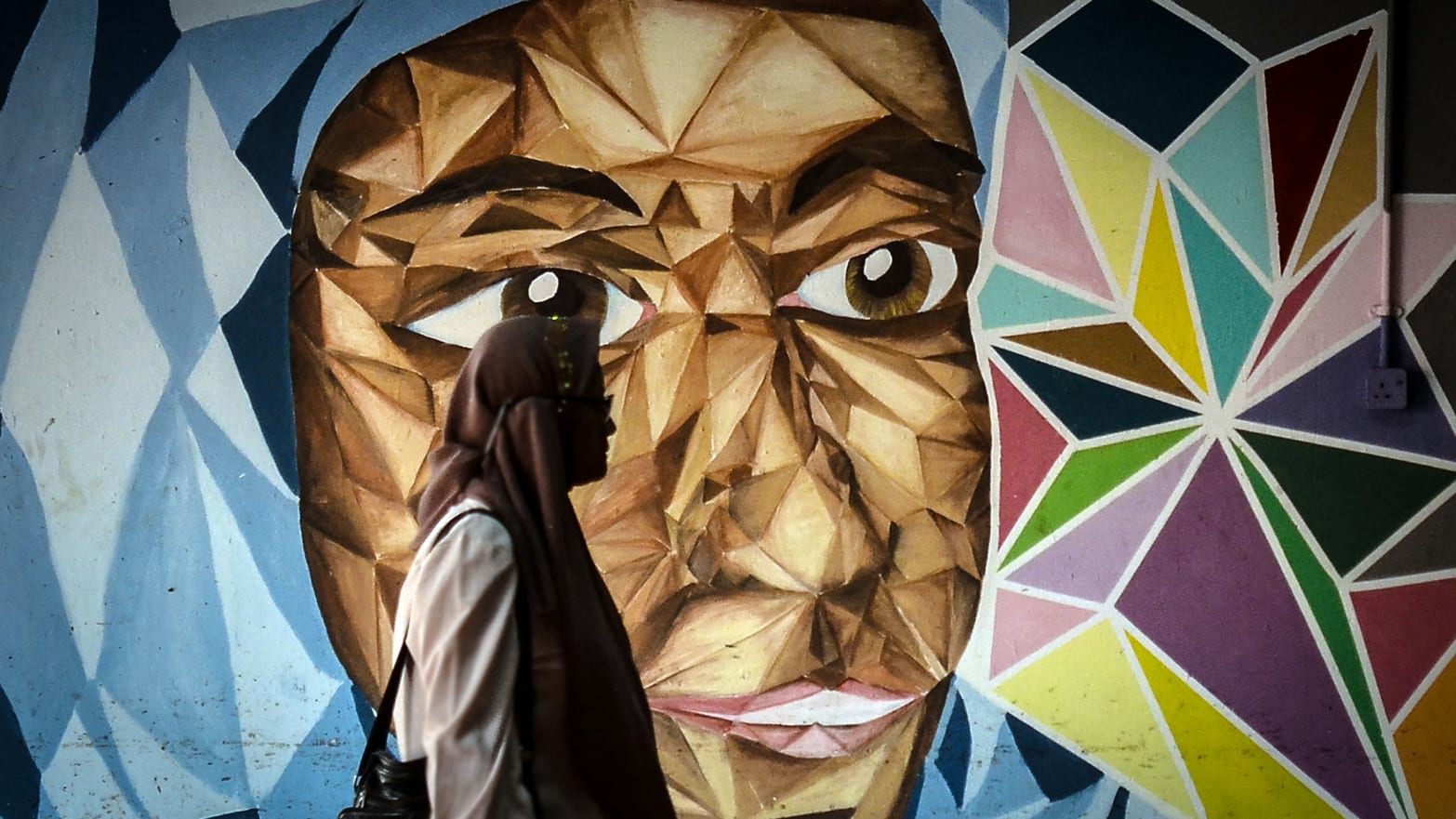This story begins in Malaysia. It begins in Malaysia, in Kota Bharu, the capital of the north-eastern state of Kelantan, on a dusty train platform at the edge of the city, not far from the river, which leads to the South China Sea. It begins here because I’m on my way to Thailand, to the provinces of the country’s deep south, where an ethno-nationalist separatist struggle, with its slight but undeniable air of jihad, has been underway, depending who you talk to, for at least the past 14 years.
I am sitting in the back of a beat-up taxi, waiting for the driver to remove an intellectually disabled teenager from the front passenger seat, where he, the teenager, is giggling at nothing. Women wander about the station in variously colored tudungs, the local version of the hijab, occasionally stealing a glance through the window and wondering what’s brought me up this way. The driver eventually gives up, readjusts the songkok on his head, and shrugs apologetically, as though to say: I guess he’s coming with us. My hotel sits above a restaurant in the center of town and one enters from the alley behind it, where the scraps are thrown out and the air conditioner leaks. Rats fuck one another at the bottom of the stairs.
In The Wet and the Dry: A Drinker’s Journey, Lawrence Osborne visits Kota Bharu at the end of a trip not dissimilar to this one. Indeed, in some ways, I’m retracing the author’s steps, only backwards and through dingier hotel rooms. The Wet and the Dry is a book about booze, and about boozing in places one normally wouldn’t, including large tracts of the Muslim world to which Kota Bharu and the border region belong. Since 1990, Kelantan has been ruled by the Pan-Malaysian Islamic Party, or PAS, which has been committed to establishing an Islamic state in Malaysia for nearly 70 years. (It goes without saying that an Islamic state and the Islamic State are rather different things.) In this respect, as Osborne suggests, Kota Bharu might be seen as a model, as something towards which Thailand’s separatists might aspire. It offers a glimpse into southern Thailand’s future, or at least into insurgent dreams of the same.
At first glance, as one wanders through the Siti Khadijah food and textile market, or eats nasi ayam with one’s fingers at an open air restaurant on Jalan Tok Hakim, or watches a group of street artists beautifying an alleyway near the Subway franchise that doesn’t serve any sandwiches containing pork, that doesn’t seem like such a bad thing. Southeast Asia could stand a few more Kota Bharus, I find myself thinking, a few more upstanding, if pedestrian, places. But then the sun goes down and I’m left wondering what to do. There’s a place serving juice on one of the corners, and doing a roaring trade in it as well, but it clears out relatively early and, in any case, juice is a morning drink. I briefly consider a trip to the movies before remembering that such trips are impossible here.
In 2016, Paragon Cinemas announced that they were going to open an eight-screen multiplex at Kota Bharu’s KB Mall. Given Kelantan’s hard-line entertainment laws — which call for audience segregation along gender lines and would prevent screenings on Thursday evenings and throughout the month of Ramadan — it was a pretty bold move, both politically and commercially. (The city’s last cinema, the Lido, closed in the 1990s after struggling to stay halal.)
The Kelantan PAS Youth organisation mobilized immediately, protesting the move on the somewhat tautological grounds that “the opening of cinemas would cause the state government to deviate from its strict rulings on entertainment outlets”. It needn’t have bothered. While Paragon and the KB Mall waited on a license from the government to come through, opening day came and went. The government claimed not to have received the application and the project eventually fell off the agenda. The Paragon website was quietly altered to say that the cinema would open in 2017. It still says it.
As the silence of the streets begins to gnaw at me, I can’t help but wonder what I was expecting. This is what theocratic states do. Most forms of singing and dancing are banned here, including the UNESCO-listed dance-drama mak yong, as, in descending order of venality, are licentious advertising, women’s skirts, and children’s puppet shows. There are separate lines for men and women at the supermarket.
What’s more, in July 2017, Kelantan’s legislature amended the state’s Syariah Criminal Procedure Enactment 2002 in order to legalize public caning for Muslims who break sharia law. They cane them after Friday prayers in a square a couple of blocks from the juice place.
While all Malaysian states observe sharia to one degree or another (non-sharia and criminal offences are covered by secular laws made at the federal level), Kelantan is the only one that actually thrashes people in public. The PAS would like to go further still. In 2015, the government amended the state’s Syariah Criminal Code II 1993 to incorporate hudud, a series of physical punishments prescribed by God in the Koran, which include amputation, stoning, and crucifixion, depending on the crime. (As tends to be the way with these things, the supporters of hudud like to assure their opponents that they’re not seriously talking about crucifying anyone. Which begs the question: if you’re going to pick and choose which of God’s laws you’re going to follow, doesn’t the argument for implementing them on religious grounds rather fall apart?) The state has only been prevented from putting this madness into practice thanks to federal laws that limit the sharia courts’ ability to wreak havoc. Late last year, Kelantan’s chief minister, Datuk Ahmad Yakob, reassured voters that the PAS hasn’t given up on hudud yet and plans to continue agitating for those limitations to be lifted.
All of which does little to reassure a non-Muslim like Lun, the Malay Chinese bartender at Golden City Restaurant, where I find myself sobbing into a bottle of Tiger at the fact that it’s taken me so long to find one. It’s not that the new caning regime will affect Lun or his family, or that hudud will do so, should those laws come to pass. As non-Muslims, they are not subject to sharia. But they are subject to the pressures and prejudices — to the obligations and unsolicited responsibilities passed onto them like sin by pious neighbors — that come with living in a society that is. Lun says he wouldn’t live anywhere else, but he looks awfully tired as he says it.
When Osborne was here earlier this decade, there were, he writes, no bars in town. At least two have opened since— Lun says Golden City came first — and this one walks an even finer line by offering bacon on its menu. Isn’t this the way of the world, though, I think, as I drink my beer and eat the flesh of the swine. The uneasy tension between progress and reaction? Between forward momentum and interminable backsliding? It seems to be happening everywhere these days: the expansion of liberty, equality and fraternity to levels unknown throughout much of history, and the immediate, slobbering counter-attack. In the West, gay marriage passes with substantial majorities as right-wing populists surge at the polls. In Kota Bharu, they open two bars, making the barest, most minimal concession to secularism, and the government introduces public flogging. You have to remind yourself constantly that the arc of the moral universe bends towards justice, because most of the time it just seems bent.
Golden City is on one of Kota Bharu’s main drags, but is masked by some well-placed pot plants on the footpath, which prevent people from glancing in and taking offence. There are neon logos above the bar, and hopeful beer towers, and sturdy bar stools, and about three customers, myself included. It is quiet and pleasant and open until late. Across the border in Thailand, this sort of place is a target.
“Do you serve many Malays in here?” I ask Lun. He and his co-manager spend most of their time on their phones.
“No,” he says. The authorities would burn our liquor license.”
“They’d burn it?”
He nods. “They’d shut us down. It look so long to get it in the first place.”
“So you ask them to leave if they ever come in?”
“They don’t come in. But if they did, we would. We don’t have any other choice. The authorities would burn our liquor license.”
“What would happen to the person who came in?”
Lun shrugs.
“Public caning, probably."
Stay tuned, as parts II, III, and IV will run over the next three days.

